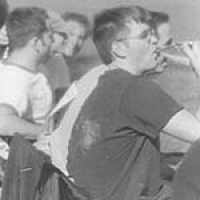Ben Gibbard .: vocals | guitar | organ | piano | and drums on We Have the Facts and We're Voting Yes Chris Walla .: guitar | organ | electric piano | "things" Nicholas Harmer .: bass Michael Schorr .: drums (The Photo Album) Nathan Good .: ex-drummer (Something About Airplanes, We Have the Facts, Forbidden Love EP)
1967 was a great time for music. There were many mediocre releases such as The Beatles' Sgt. Pepper's Lonely Hearts Club Band, Jimi Hendrix' Are You Experienced?, The Doors' self-titled album, and The Velvet Underground's debut release. But underneath the creative din, lied a comedic masterpiece by a band dubbed the Bonzo Dog Doo-Dah Band. At the heart of their debut album, Gorilla, appeared a song called "Death Cab for Cutie." 30 years later, four men from Bellingham, WA were there to capitalize. (Hey, it could've been worse; other song titles on the album were "Jazz, Delicious Hot, Disgusting Cold!" and "The Equestrian Statue.")
Originally created as a solo project, Ben Gibbard (who formerly recorded under the moniker All-Time Quarterback) recorded You Can Play These Songs' Chords with his friend/guitarist/keyboardist Chris Walla. Soon after, Gibbard recruited bassist Nick Harmer and drummer Nathan Good to round out a full-time band. From then on, Death Cab for Cutie has been anything but stagnant.
In 1999, Elsinor and Barsuk Records co-released Death Cab's first full-length album, Something About Airplanes. This album marked a departure from the pop ditties that used to grace Gibbard's songwriting; the songs were intricate and more somber than before. This album set the standard for all future Death Cab releases.
In 2000, the highly lauded We Have the Facts And We're Voting Yes was released on Barsuk. Death Cab once again placed themselves on a higher pedestal with a more engaging yet minimalist approach to songwriting, raising comparisons to Bedhead and Built to Spill. Just prior to the release of We Have the Facts, Good left the band and was soon replaced by Michael Schorr. The Forbidden Love EP was released later that year.
With two full-lengths and a solid EP under their collective belts, Death Cab had gained a bigger and stronger fan base; and their constant touring in support of these albums only strengthened their status in the indie-pop domain. 2001 saw the release of their third full-length, The Photo Album (Barsuk). With more focused songwriting and dynamic drumming, Death Cab take full advantage of the pop medium, never relying on studio tricks and experimental wankery to bring their message across.
When it comes down to it, Death Cab for Cutie is a pop band. But what separates them from the rest of the sheep is the pure emotion and genuine sincerity of each note. Their music awakens an emotional beast and evokes a feeling that only heartfelt songwriting coupled with amazing talent can produce.
